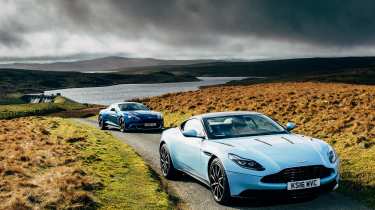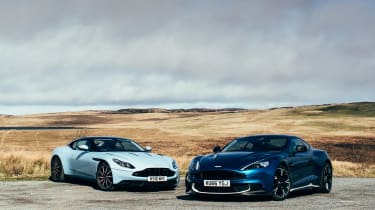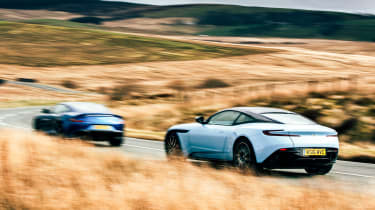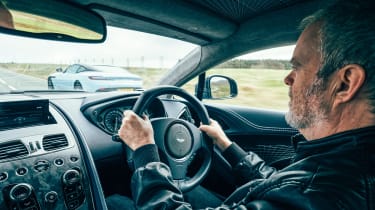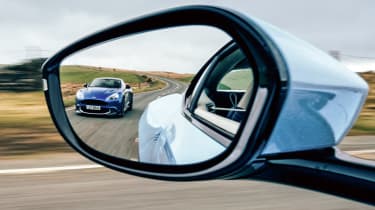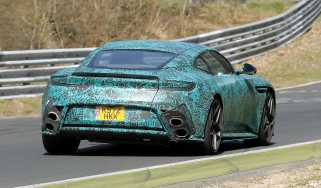Aston Martin DB11 vs Aston Martin Vanquish S review - battle of the V12s
The Vanquish S and DB11 are both V12-engined super-GTs, but one is naturally aspirated, the other is the first turbocharged Aston Martin.
As cognitive scientists are fond of reminding us, memories are unreliable. They’re also a measure of experience: the stronger the experience, the more vivid the memory. So, to begin, I’ll share these stripped-back recollections with you. Over the thousand or so miles between Florence airport in Italy and my house in Kent, the Aston Martin DB11 that I drove in summer 2016 left me in no doubt that GT perfection had been recast in the image of Aston’s sharp new platform, powertrain and design language. But a few months later, on the challenging Clun section of Motor magazine’s old group test route in Shropshire (a place of putative terror in my youth that I hadn’t visited in decades), Aston’s latest self-styled ‘super-GT’, the Aston Martin Vanquish S, gave me goosebumps; an old-school adrenalin shot and then some. And if we left it at that – a division of responsibilities and effects comfortably complicit with Aston’s own script on the matter – it wouldn’t be a crime. There’s the DB11 customer and there’s the Vanquish S customer, and they’re presumed to be not the same person.
> Aston Martin DB11 V12 review
But they might just be after the same thing. There’s significant overlap here that can’t be made to disappear with the wave of a marketing wand. Headline hardware and stats for a start. In the starkest terms, Aston has two 600bhp, V12-engined coupes on its books. Both are capable of around 200mph and accelerating to 100mph in under 10 seconds. From memory I could have a stab at telling you which was the superior, more satisfying steer. Actually, I will. The Vanquish S. But maybe it’s because it’s slightly fresher in my mind and stirred up long-forgotten feelings on that Clun road.
So, to settle this once and for all, our day begins on a narrow, normally unexplored road that spears off at a right angle from the first leg of the evo Triangle in Denbighshire, Wales. It leads to a pretty reservoir, replete with roaring aqueduct and, when we eventually roll to a halt, a DB11 and Vanquish S vying for aesthetic prominence in the viewfinder of photographer Malcolm Griffiths’ Canon. Both are evidence of Aston’s knack for producing jaw- dropping shapes, but, after a period of chin-in-hand reflection from several angles, Antony Ingram, Nick Stafford and I agree with Malcolm that it’s first blood to the remastered old-timer.
In a bold colour – the Madagascar Orange of the car I drove back from Florence, for example – the DB11 is drama on wheels, as you might hope given the design and aero cues from Aston Martin One-77 and Vulcan. In this car’s My Little Pony pearlescent hue (or Mako Blue as Aston would have it), not so much. The Vanquish S looks almost alarmingly sex, drugs and rock ‘n’ roll by comparison, an impression massaged by its blisteringly blue metallic paintjob. Maybe the front spoiler is a little too jutting for perfect front- to-back harmony but, technically, it achieves just that. Aero plays a vital part in raising the new ‘old’ model’s game, the object being to increase grip at the front while maintaining stability at the rear, which the splitter does by reducing front lift from 66kg to 18kg at 150mph. Yet, stand back, and the overall impression is of a final, exquisite resolution of everything that’s come before, right back to Aston Martin DB7.
The Vanquish S is shot through with this meticulous attention to detail, a reframing of artisanal ‘Aston-ness’ for a new audience. A cold wind is whipping across the reservoir, so I duck inside while Malcolm rattles off the last few details on the DB11. Apart from the curiously angled corners of the steering wheel (why?), it’s a great cabin. The low-slung seats and high waist engender feelings of snugness and security and there’s a dense, hewn-from-solid quality to the leather-clad forms and trimmings that makes the leaner, cleaner architecture of the DB11’s more spacious and airier interior seem a little insubstantial. Then again, the Vanquish S costs £45,050 more than the DB11 so you’d expect it to be materially the more luxurious item. Maybe you can lay it on a little too thickly, though. I search in vain for a label that says ‘white stitching by Spirograph’, but I have my suspicions.
We’d wanted to take these cars to Scotland but the weather forecast was dire. Defaulting to a cloudy and windy but thankfully dry Snowdonia, at least the roads are familiar and don’t need learning. Having driven here at a feebly sub-optimum, traffic-clogged pace in the Vanquish S, I decide first to reacquaint myself with the DB11 and an Aston that, at last, has most of the competition on the back foot. Billed as the company’s all-purpose GT for the unfolding Andy Palmer-led era, it’s necessarily a broad-bandwidth proposition: a bolide with the ‘ballistic’ subtly concealed until required. It’s the car that replaces the DB9, the DB10’s short life having been lived only in James Bond fantasy land. Body and front and rear tracks are significantly wider than the DB9’s and, by making the wheelbase 65mm longer, it’s been possible to mount the all-alloy 5.2-litre twin-turbo V12 further back in the chassis. With outputs of 600bhp and 516lb ft, it’s the most powerful motor ever to go into a series- production Aston – also the most sophisticated, with ‘intelligent’ cylinder bank deactivation, (it depends on load but you can’t tell) and the more usual stop-start function.
> Aston Martin Vanquish S review
The DB11 can do smooth and suave in its sleep. The micro-managed shifts of its eight-speed ZF auto are all but imperceptible. Its cabin is airy, easy to see out of and double-glazed. And the very-nearly-circular steering wheel places engine map options and adaptive damper settings at my thumb-tips. All great company between Florence and Whitstable for sure, but I can’t wait to find out what this 5.2-litre, twin turbo V12 feels and sounds like here on the Triangle: live, loud and, with Sport+ engaged, unplugged.
To be honest, it’s not that loud but, oh, the singing voice. Despite what you’d expect to be the muffling influence of the twin turbos, a complex, multi-layered V12 bellow is delivered with unfettered resolution that sends all the right messages to the small hairs on the back of my neck but, unlike the too-damn-loud Vantage GT8 on last year’s eCoty, stays just the right side of anti-social. The Vanquish S may have more sonic swagger – actually the rather arbitrary rev- determined opening of the exhaust valves on the drive up proved wearing after a while – but the DB11’s soundtrack is no less soul-stirring for its comparative couth and lack of raw decibels. No matter, it’s pretty sensational to feel the torque- dense delivery of the engine firing on all 12 and the added layers of urgency and gearshift speed unleashed by the most extreme powertrain setting. If the throttle doesn’t quite have the razor-edged responses of the larger-capacity, naturally aspirated V12 in the Vanquish S, neither would I guess the engine was turbocharged. And it feels punishingly rapid through the mid- range, its thumping reserves of torque making laughably light work of overtaking even the more determined Triangle travellers.
> 2018 Bentley Continental GT review
Although entirely electric, the steering is good and direct with well-judged about-centre weighting and enough feel and transparency to lean on the front end with confidence, the merest roll of the wrists accurately guiding the big car through fast sweepers with minimal wasted effort. Directional agility meets terrific natural stability and it’s a great feeling. For a car that Aston claims to be its softly calibrated GT in the great scheme of things, the DB11 sure has some sharp moves. Yet it does the other thing with equal facility, too. Returned to the relative decorum of the ‘touring’ mode, the upper-register sonority of its exhaust note on a light throttle is actually quite soothing and, on the most pliant of the three selectable damper settings, the ride’s pretty comfy as well. Enough for now. A harder nut awaits.
With 595bhp at 7000rpm and 465lb ft at 5500rpm, the older, naturally aspirated V12 powering the Vanquish S doesn’t have quite the firepower of the smaller, turbocharged mill. But, at 1739kg, the S is 31kg lighter than the DB11, so the power-to-weight ratios are almost identical: 344bhp per ton for the DB11 plays 349. With launch control, wider rear rims and stickier rubber, the S has the fiercer initial acceleration, hitting 60mph in 3.85sec (versus 3.96sec) according to our VBOX, but beyond 100mph the DB11 gradually pulls away.
Subjectively, too, the Vanquish S doesn’t feel quite as quick when rolling on, lacking the DB11’s pulverising mid-range punch. But it does feel more exciting, dramatic and intense, the engine’s aerobic violence building and soaring to an absolute peak before its eight- speed auto – every bit as smooth and swift as the DB11’s – reloads for another manic lunge for the horizon. It’s dangerously addictive.
> 2018 Aston Martin Vantage revealed
The Vanquish S is narrower than the DB11 and feels it. Dynamically it’s a different proposition, too. It asks a little more of the driver and requires more concentration to place accurately. It has simply masses of grip at both ends. Ultimately its limits are higher than the DB11’s but dissolve towards a satisfyingly mobile and playful edge, especially with its Sport settings locked in. The DB11 is more prescriptive. It feels tidy and planted at speed over uneven surfaces but asks you to place more trust in its torque-vectoring than your own reactions. You think you’re travelling faster in the DB11. You probably are. In the Vanquish S it seems less of an issue; you tend to revel in the process.
The basic deal has its foundations in that huge available grip but teamed with lickety- split responses and remarkable helm acuity for a GT, even a super one. The steering is weightier than the DB11’s but even more precise, while body control has a tauter, more knuckley, feel to it. It means I can sense the suspension, damping and tyres working a little harder but within more tightly defined limits. The chassis tracks the road’s undulations more closely, removing the jolts and stings with expertly judged damping. The figures say the Vanquish’s carbon-ceramic brakes are superior, but both cars’ are capable of soaking up serious punishment without fading.
The Vanquish S would also be a great car in which to attack a big distance: acceptably comfortable, easy on the nerves and constantly engaging. Indeed, I’m beginning to suspect that my initial (unreliably remembered) hunch is correct. Of the two circa-600bhp Aston Martin GTs, the naturally aspirated V12 Vanquish S is the more super. I reckon I need a final fling in the turbocharged DB11 to confirm it.
Life on roads like these shouldn’t be easy for the DB11. On paper it’s too wide and a mite too heavy. A brisk lick, leaning on those bounteous torque reserves, seems to be more its tempo. But, once again, switching in Sport+ has an amazingly transformative effect on the car. In a blink, it summons greater precision and resolve. That feeling of rock-solid stability yet swift, incisive turn- in urges greater commitment and permits later braking and a slicing cut towards the apex almost on a par with the Vanquish’s best game.
> New Aston Martin Vanquish spied
True, magnificent as the fully lit, Sport+ mapped V12 is on the straights, it doesn’t pay to hang on to the final few hundred revs. That’s peak thrill in the Vanquish S but, in the DB11, it’s better to nail a full-throttle rhythm that punches successive gears back into the heart of the torque. Then the DB11 feels epic.
What’s so special about the DB11, what it does better arguably than any other GT currently on sale, is cover so many bases with so much style and charisma. It’s strong across the board; there are no visible chinks in its armour. It can be as relaxing or involving as you want it to be. A car it’s a pleasure to spend time in at a loping cruise, but one with a powertrain that can switch from serene to savage in a heartbeat. Its repertoire has real, multi-faceted depth served up with a kind of super-heroic confidence. It’s one of the great ‘I’ve got this’ cars, ready to rumble on demand beneath the surface civility.
The Vanquish S is a less convincing chameleon, never fully able to mask its desire to bite chunks out of the horizon. It sacrifices breadth for focus, but is none the worse for that. Perhaps it’s the zero-sum game Aston intended all along. What’s undeniable is the DB11’s greater spread of assets. The Vanquish S, on the other hand, has the deeper appreciation of the art of driving. The thrill, too.
